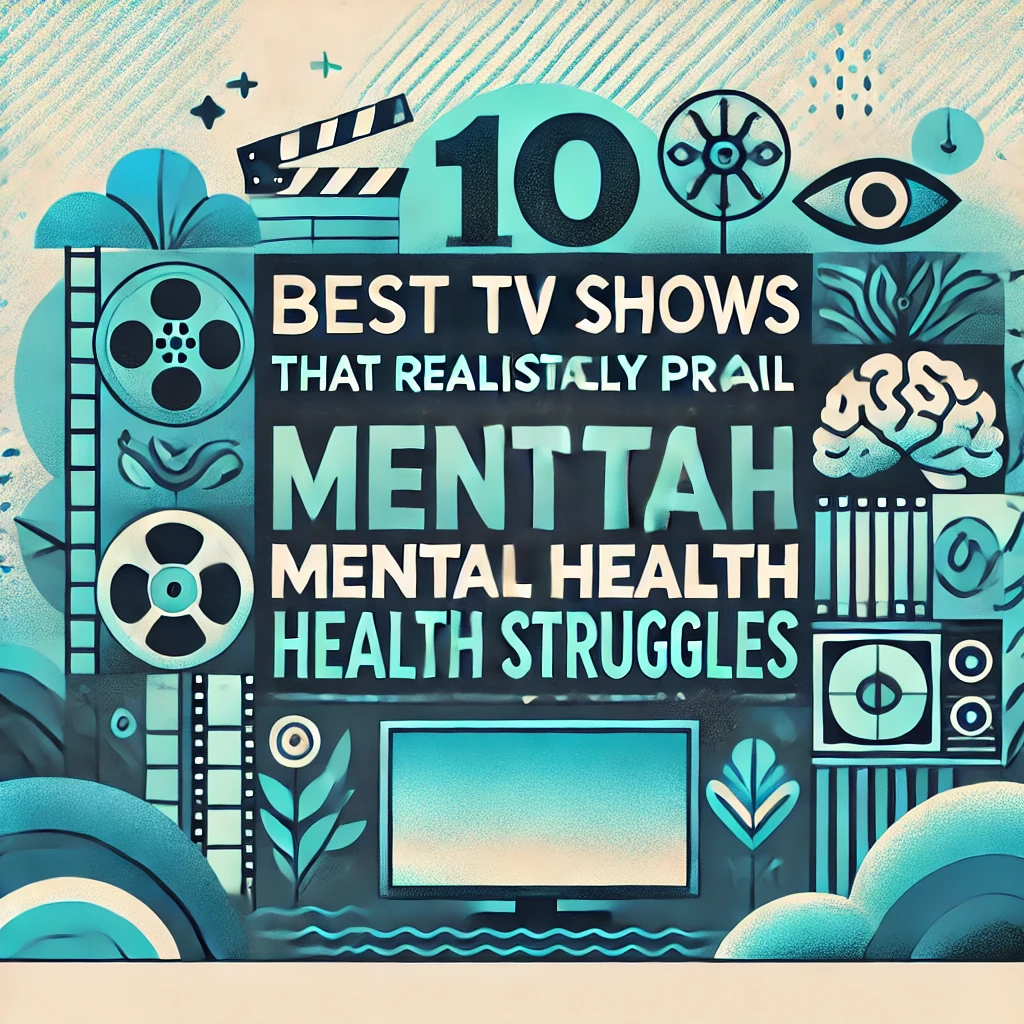Table of Contents
1. Introduction

- For a long time, television has reflected the society known as human emotions, struggles and victory. For many years, mental health has been an important topic on television shows, shedding light on questions about depression, anxiety, PTSD, addiction, personality disorders, and more. These expressions play an important role in breaking stigma, promoting open discussion, and providing a sense of expression to those facing similar challenges.
- can have both positive and negative effects. If done correctly, it will promote understanding, empathy, awareness and help the audience recognize the importance of referring to the character and asking for help. Shows like Bo Jack Horseman and Euphoria have been praised for their raw, realistic representations of mental health, which show the complexities of addiction, trauma and self-destructive behavior.
- Meanwhile, some shows can correctly present or sensitize mental illness, which can lead to harmful stereotypes and misunderstandings. Inaccurate expressions can generate unrealistic expectations of treatment, medication, or recovery. Therefore, it is important for writers and creators to approach these topics with sensitivity and reliability.
- If conversations about mental health continue to grow, TV shows have a unique opportunity to enhance and inspire change by telling a dedicated, true story.
2. Why Mental Health Representation in TV Matters
Mental health has long been a stigmatized topic that has often been misunderstood or ignored in mainstream media. But television has the power to break this stigma by expressing psychological battles in a reliable and authentic way. When characters openly discuss their struggle with fear, depression, PTB, or other illnesses, they help normalize these conversations and encourage audiences to find help without fear of judgment.
Storytelling plays an important role in sensitizing and promoting empathy. By passing through well-developed, realistic battles, the audience will have a deeper understanding of the meaning of living in a state of psychological well-being. Shows like this are us, and Ted Lasso humanizes psychological challenges that represent both fight and coping mechanisms, stimulating hope and resilience.
Media also has a major impact on public perception. When television shows have accurate mental health issues, they form an audience and challenge harmful stereotypes. However, misleading or exaggerated expressions can spread misinformation and increase negative distortion. Responsible storytelling can change social attitudes and make discussions for mental health more open and integrated.
As awareness grows, television remains a powerful tool for understanding, debating, debating and trading mental health.
3. Best TV Shows That Address Mental Health
A. Drama
with deep mental health topics Some of the most persuasive TV dramas offer a raw and realistic expression of mental health. Bo Jack Horseman examines depression, addiction and self-destructive behaviors, highlighting the complexities of personal growth. This is sensitive to us with fear, sadness, and PTSD, and shows how previous trauma can affect our lives. Happiness deals with addiction, trauma and personality disorders, representing the difficult realities of substance abuse and mental illness. Atypicality gives insight into autism and social fear after youth navigate relationships and independence. The show helps to break the stigma and provide a powerful story that uses audiences from around the world.
B. Comedy shows tackling humor in mental health.
The crazy ex-girlfriend portrays borderline personality disorder (BPD), treatment and drugs with humor and integrity. Ted Lasso shows the balanced moments between deep emotional battles and carefree, shady moments, leadership horror, optimism and vulnerability. They are the worst institutions in PTBS for depression and relationships, offering raw yet strange attitudes towards mental health issues. These shows prove that humor and integrity coexist and help normalize conversations about mental health, while also providing interesting and wise storytelling.
C. Psychological thrillers and mystery shows
Mr. Robot deals with dissociative identity disorder (DID), fear and loneliness by the protagonist who wrests with his inner demons and simultaneously reveals plot. Queen Gambit presents a compelling journey of addiction, trauma and coping mechanisms that emphasize the psychological tributes of genius and competition. Mindhunter explores the ideas of criminals, sheds light on mental disorders, and develops criminal psychology. These shows offer intensive stories that provide insight into mental health through inspiring and dramatic storytelling.
D. Medical and Psychological Show
Medical and Psychological Drama provides an expression of surrounding mental health with a high environmental mission. Why depression, suicide awareness, and bullying have been caused, and why important debates about teenager mental health. House M.D. examined antisocial tendencies and depression through his brilliant but worrisome protagonist, highlighting the complexities of professional mental illness. Good Doctor presents the spectrum and social challenges of autism and warmly views the neurodiversity of medicine. These shows not only maintain audiences on psychological health issues, but also train awareness and empathy through persuasive storytelling.
4. Impact of These Shows on Audiences
Television shows that represent internal health can have both aggressive and negative products in the cult. They should be proactive in raising awareness, promoting empathy and promoting open exchange. By showing realistic strugglesin depression, anxiety, PTSD, dependency, and neurodiversity, these shows help to divide the internal
health issues. Characters navigate means, drugs, and mechanisms encourage the audience to ask for help and refer to their situation. Shows like Bo jack Horseman and Ted Lasso offer subtle descriptions. This makes internal health more mainstream. Nonetheless, there are companies about false presentations, glory and drive content. Some have shown that May is exaggerated or absolutely an internal health condition. For illustrations, 13
5. Conclusion
Television plays an important role in designing public perceptions of mental health. Over the years, television shows have grown from topics that escape mental health to struggle for deeper depth and sensitivity. This change has helped break stigma, raise awareness and promote empathy. With the presentation of characters who must deal with depression, anxiety, anxiety, anxiety, anxiety, PTB, addiction, and neurodiversity, these shows normalize discussions for mental health and help viewers to encourage better support and understanding.
This increased responsibility means that the storyteller must ensure that the presentation is accurate and sensitive. Shows like Bojack Horseman and Ted Lasso present mental health in a compassionate way, but take risks to others, mispresent them, leave them famous or cause content. Inaccurate or exaggerated expressions can increase harmful stereotypes or provide misleading information about treatment, medication, and recovery.
Move forward and responsible narratives are important. Writers and creators must work with mental health professionals to create a compelling and authentic act. As audiences become more conscious and committed, television can become a powerful tool for education, information and supporters to better express mental health. With careful discussion, television can continue to inspire positive change in terms of mental health and social answers.
Frequently Asked Questions (FAQs) on Mental Health in TV Shows
1. Why is mental health representation important in TV shows?
Mental health representation in TV shows helps break stigma, raise awareness, and foster empathy. It allows audiences to see realistic portrayals of mental health struggles, encouraging open discussions and promoting understanding.
2. Which TV shows portray mental health accurately?
Shows like BoJack Horseman, This Is Us, Ted Lasso, Atypical, and The Good Doctor have been praised for their realistic and sensitive portrayals of mental health conditions.
3. Can TV shows negatively impact mental health?
Yes, some shows may misrepresent mental health conditions, glorify harmful behaviors, or include triggering content without proper warnings. It’s essential for viewers to approach such content mindfully and seek support if needed.
4. How do TV shows influence public perception of mental health?
TV can shape how people view mental health issues, either positively by promoting awareness and empathy or negatively by reinforcing stereotypes and misinformation.
5. What should creators consider when depicting mental health on TV?
Creators should prioritize accuracy, consult mental health professionals, and avoid sensationalizing or misrepresenting conditions to ensure responsible storytelling.
read more








Hello, for all time i used to check weblog posts here in the early hours
in the break of day, since i enjoy to gain knowledge of more and more.
casino en ligne francais
Hmm it looks like your website ate my first comment (it was extremely long) so I guess I’ll just
sum it up what I wrote and say, I’m thoroughly enjoying
your blog. I as well am an aspiring blog writer but I’m still new
to the whole thing. Do you have any recommendations for newbie blog
writers? I’d definitely appreciate it.
casino en ligne
Hello, I think your website might be having browser compatibility issues.
When I look at your blog site in Safari, it looks fine
but when opening in Internet Explorer, it has some overlapping.
I just wanted to give you a quick heads up!
Other then that, awesome blog!
casino en ligne
Hi there just wanted to give you a quick heads up. The text in your article seem
to be running off the screen in Chrome. I’m not sure if this is a format issue
or something to do with web browser compatibility but I thought
I’d post to let you know. The style and design look great though!
Hope you get the issue fixed soon. Cheers
casino en ligne
Howdy! I could have sworn I’ve visited this website before but after browsing through some of
the articles I realized it’s new to me. Nonetheless, I’m certainly
pleased I found it and I’ll be bookmarking it and checking back frequently!
casino en ligne
It’s really a nice and helpful piece of information. I’m glad that you simply shared this useful info with us.
Please keep us informed like this. Thanks for sharing.
casino en ligne
Hi, I desire to subscribe for this weblog to get hottest updates, thus where can i do it please help.
casino en ligne France
I think this is one of the most significant information for me.
And i am glad reading your article. But wanna remark
on some general things, The site style is perfect, the articles is really great : D.
Good job, cheers
casino en ligne
I was suggested this web site by my cousin. I’m not sure
whether this post is written by him as nobody else know
such detailed about my problem. You’re amazing! Thanks!
casino en ligne
Hello there! Do you know if they make any plugins
to assist with SEO? I’m trying to get my blog
to rank for some targeted keywords but I’m not seeing very good gains.
If you know of any please share. Thank you!
meilleur casino en ligne
MultiChain